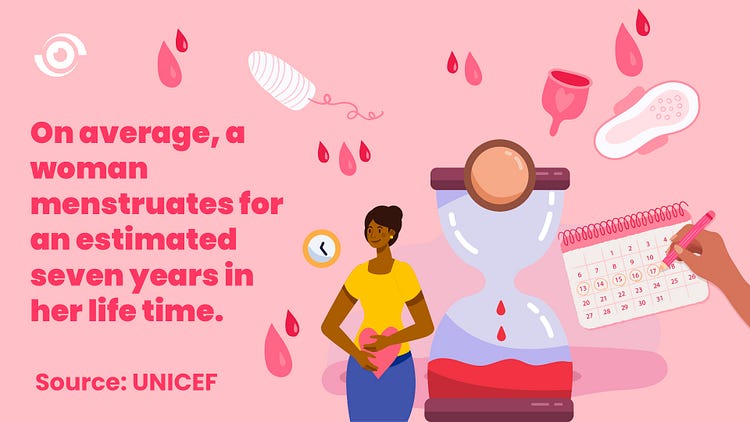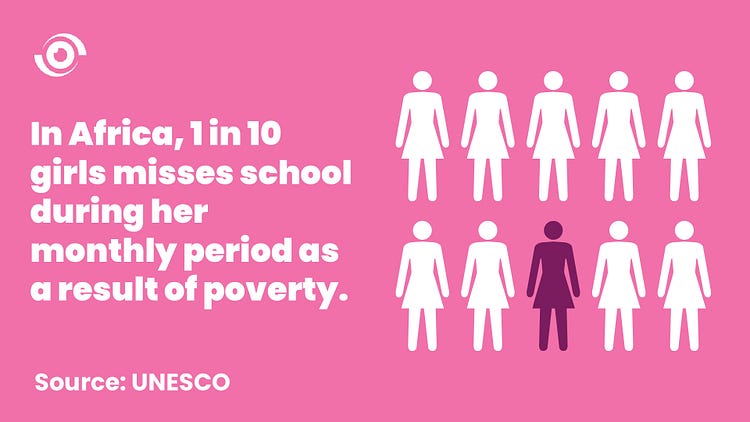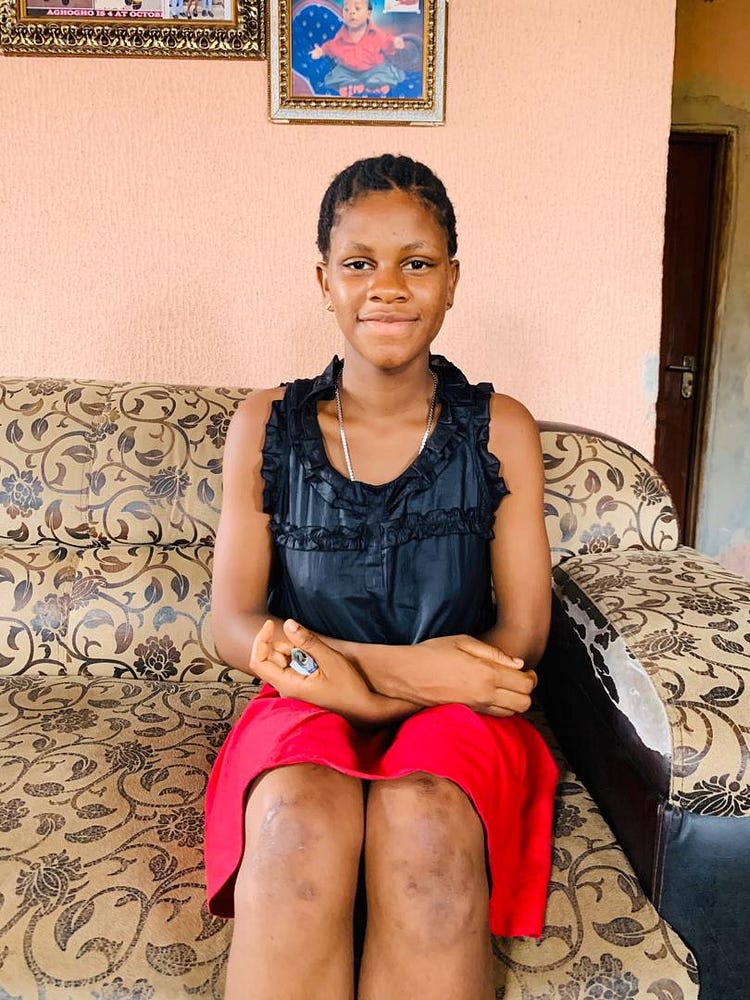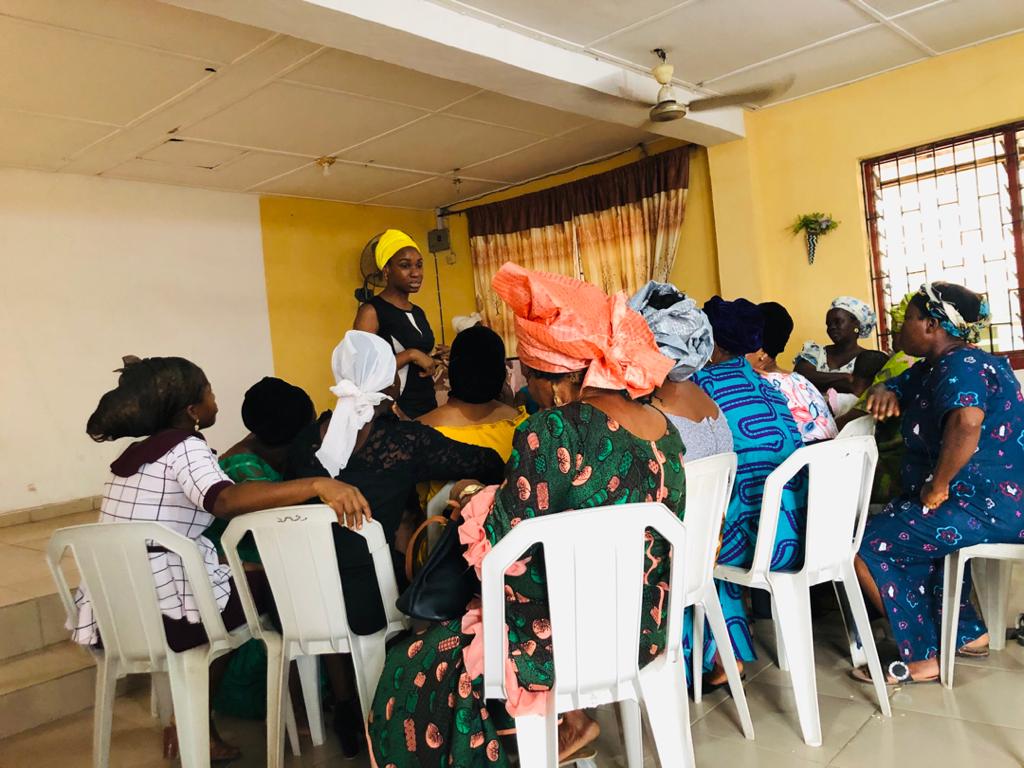In total, a woman menstruates for an estimated seven years during her lifetime. During this time, in addition to grappling with mood swings due to hormonal changes and stomach discomfort, she must maintain her personal hygiene. One of the measures is using menstrual hygiene products to collect and hold blood during the monthly menstrual cycle. In a nutshell, it is seven years of challenges, resilience, and determination.
Ochuko Samson is 16, and preparing for her senior secondary certificate exams. She says her journey through school has been challenging, especially since her periods started a few years back. Samson lives with her parents in one of the neighbourhoods on the outskirts of Warri in Delta state. Throughout her teenage years, Samson believes she missed more classes than she can count. Like many other Nigerian girls in school, she had to grapple with period poverty, a situation where she and her family could not afford menstrual products for her. Even though she tried using strips of cloth on some occasions, Samson said the discomfort and fear of leakage discouraged her from going to school when she was menstruating and didn’t have pads. “It was frustrating, a pack of pads costs N450 ($1.10) and it’s not every month I come by that amount’’, she said.

For a number of girls and women, menstruation comes with unbearable costs as they find menstrual hygiene products practically unaffordable. The products usually are not reusable and so must be bought every month. With more than 83 million people living below the poverty line in Nigeria, menstrual products are a luxury many cannot afford. For girls and women in that situation, it means missing school or work, or resorting to the use of cloth strips or foams which could result in discomfort and even infections.
For Samson, relief came in November 2020 during a Sunday church service. “After service we were told to stay back for some lessons on menstruation’’ she said. Samson and 39 other girls and women were taught menstrual hygiene practices by volunteers working with Girls for Development Goals Foundation (GDGF), a female youth-led non-governmental organisation working to improve girl child development in Nigeria. The volunteers taught Samson and the other girls an alternate method of menstrual management — the use of a menstrual cup — after which those who indicated interest in using the cups were given them free of charge. Samson has been using the cup since then and says she no longer worries about money to purchase menstrual pads every month as the cup can be washed and reused. More importantly, she no longer misses school because of her period and doesn’t have to worry about leakage anymore.
On a mission to address period poverty
GDGF is an Asaba, Delta State-based NGO. In 2019, GDGF started working on menstrual hygiene practices in some communities in Delta state. Their work on period poverty is a personal calling that meets a disturbing reality. Benedicta Uweru-Apuamah, the organisation’s co-founder, pointed out that, ‘’Any girl that has attended public secondary school, especially boarding school, has a story about menstrual poverty,’’ adding. ‘’All of us at GDGF share that experience.’’ Their work includes training on basic menstrual hygiene and provision of sanitary pads to young girls in communities. They buy the pads with their personal funds. To improve the sustainability and reach of their program, GDGF reached out to OrganiCup, a menstrual cup manufacturing company in Denmark for donation of their products. The company sent down 204 cups to the organisation which they received in September 2020. Two months later, GDGF started distributing the cups during their menstrual hygiene trainings in selected communities in six states across the six geopolitical zones of Nigeria.
The period poverty burden
It is estimated that more than 500 million women and young girls experience period poverty every month around the world. In Africa, one in every 10 girls misses school when menstruating, mostly as a result of the inability to afford menstrual products, significantly affecting their education and possibly contributing to drop-out rates of girls from school. This is in addition to several health problems, such as urinary tract infections, that could result from poor menstrual hygiene due to poverty. Another aftermath of period poverty is depression. A 2018 study revealed that 39% of women and girls who suffer period poverty develop anxiety or depression, which could go on to affect them socially and economically for the rest of their lives.

A possible solution to an age-old problem
The menstrual cup has been around since the 1930s. The product has however not been well known and used especially in Nigeria, despite its benefit of long-term use of up to two years. The menstrual cup is available in various sizes, depending on the age of a woman, according to Uweru-Apuamah. The usage of menstrual cups is gaining traction across the world. A 2019 review by Lancet indicated that menstrual cups are a safe and acceptable option for menstrual management and are being used in several countries around the world including low- and middle-income countries. In Malawi, a non-profit organisation ActionAid is distributing the products in addition to menstrual education in schools as a way of reducing school absenteeism during menstruation. Menstrual cups are also one of the menstrual products being given free to primary and secondary schools in England in a government approach to fighting period poverty. The cups are being used in Kenya by menstrual hygiene management trainer Ebby Weyime to address period poverty especially among school aged girls. The price of menstrual cups varies from as low as N400 to N6000 ($1 — $15) on the Nigerian online retailer Jumia. Compared to sanitary pads, retailing from N1000 ($2.50) . Despite the high initial cost, menstrual cups are more cost effective, in the long term as they are re-usable and also more environmentally friendly.
Providing relief for young women
‘’It was a sigh of relief’’, says Rahab Musa, a 21-year-old student at Adamawa State University Yola. Like Samson, Musa started using the menstrual cup in November 2020 when GDGF carried out menstrual sensitisation training and cup distribution in her Damare community on the outskirts of Yola, the Adamawa state capital. According to Musa, period poverty was almost a monthly reality for her, as she is not able to afford menstrual pads on most occasions. In such months, Musa said she stayed at home instead of going for lectures. Some months, she uses strips of cloth. ‘’There was a time I got a serious infection which I believe was from the cloth I was using. I had to get treatment which was another expense. My parents helped,’’ she recounted. Having no other option, she had to continue using them on months she could not afford pads. However, since she started using the donated menstrual cup, worrying about buying pads monthly has become history even in months she has money to buy. ‘’It is a money saver,’’ she concluded.
Musa shares the same experience with Avwaruroro Oghenefejiro, a 20-year-old student at Delta State University. Oghenefejiro was one of the women who received the cups in Warri, at the same time as Samson. According to her, menstruation always came with the fear of not being able to afford a pad prior to receiving the cup. As a student, some months she had to forego other needs to buy pads. That challenge has been overcome with the donated menstrual cup.

A challenge to governments and organisations
Menstruation is a reality every girl and woman lives with; however, period poverty is a challenge only girls and women from lower socioeconomic status face. As it stands, the lowest price of a pack of menstrual pads is N1,000 in Nigeria, way out of reach for millions of girls and women. For Nigeria to achieve the Sustainable Development Goals (SDGs), especially SDG6, this inequity must be addressed. Organisations working in the sexual and reproductive health programmes should go beyond improving access to contraceptives and include improving access to menstrual products for girls and women who cannot afford them. Government can leverage on the green dot initiative for family planning services at health facilities to incorporate provision of menstrual products and services.
Government at all levels should collaborate with organisations to provide free menstrual products in all public schools, from primary to tertiary institutions. In South Africa, due to pressure on policy makers from civil society organisations, there were calls to remove taxes on sanitary products as well as providing school girls that have started menstruating in primary and secondary schools with free menstrual health products. Other organisations addressing the challenge of period poverty include Lolo Cynthia who distributed re-usable pads in Lagos. This context-sensitive intervention addressed the need for an affordable solution to poor access to menstrual health products, while also taking into account the need environmentally-friendly waste management.

Still room for improvement
Girls for Development Goals Foundation should be credited with daring to address one of the least discussed social and health challenges in Nigeria. To achieve more impact, they should employ a more targeted approach. This could be targeting girls and women directly through their schools and community associations and ensuring that only those who cannot afford the products receive them. Presently, menstrual cups are not well known in Nigeria and even though this could change in the future, it is likely to be a gradual change. GDGF could partner with media organisations and other civil society organisations to create better awareness of the benefits of menstrual cups in alleviating period poverty.
However, a bigger challenge remains. The inadequate availability of data to evaluate how such interventions are addressing the wider issue of access to affordable menstrual health and hygiene products. This may mean that interventions may seem fragmented and poorly targeted. Addressing period poverty will require ensuring access to affordable menstrual health products that are appropriate for the local context in which the young girls live, taking into account any disposal requirements. In addition, better awareness of menstrual and reproductive health will remove any stigma that girls may face, resulting in their education being compromised.
But for today, young women like Ochuko, Rahab and Avwaruroro can live their lives free of the huge burden of period poverty, thanks to the efforts of GDGF.



This is really a welcomed development. I am so excited to hear this as I have only seen the menstrual cup on YouTube and other foreign sites. I didn’t know they were available here in Nigeria. Please schools in rural areas should be targeted more and taken as first priority. They should also be made available in pharmaceutical stores. Thank you.
Good day,
I need this menstrual cup in wholesale so I can give out to those in my community.
08035437207 is the number. If you have a supplier in Imo state, it would be better. Thank you
How can I get the menstrual cup in Abakpa Nike Enugu.
Good day, am so enchanted by this menstrual cup. I have always had problems using pads and never heard anything about these cups. I would love to have it for the girls in the school where I teach, many of them cannot afford pads and as a teacher, I go out of my way to buy them pads and sometimes they evem have to stay at home whenever they are having their periods. How can you be of help to us please.
Hello Elizabeth,
Thank you for all you are doing to help alleviate the effects of period poverty in your school. You can connect with the foundation on their Facebook page – https://www.facebook.com/girlshealthandeducationfoundation.